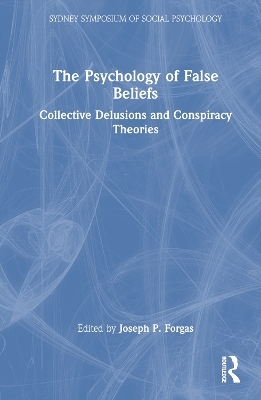
The Psychology of False Beliefs
Routledge (Verlag)
978-1-032-83413-9 (ISBN)
- Noch nicht erschienen (ca. April 2025)
- Versandkostenfrei
- Auch auf Rechnung
- Artikel merken
This insightful book outlines the social psychology of false beliefs and tribal delusions, examining the common human tendency to create and maintain collectively shared belief systems that are have no foundation in reality. Bringing together leading international researchers, the book explores how evolutionary, biological, cognitive, and social variables shape the creation and maintenance of widely shared, but obviously false belief systems. It explores how psychological processes promote the formation and maintenance of fallacious beliefs and discusses the philosophical and epistemological criteria we can use to classify some beliefs as false, and others as true.
The chapters draw on many core areas of contemporary social life where false beliefs are of topical interest, highlighting the applied implications of this line of research. Topics include political polarisation, false narratives about group differences, pandemic conspiracy theories, fallacious theories in academia and the role of the media and the internet in creating distorted narratives.
The book is engagingly written and will be of great interest to students and researchers in social psychology and the social sciences, as well as anyone seeking to understand one of the most intriguing issues that shapes human social life.
Joseph P. Forgas is Scientia Professor of Psychology at the University of New South Wales, Australia. He received his D.Phil. and D.Sc. from the University of Oxford and his research focuses on affective influences on social cognition and behaviour. He published over 30 books and 300 papers and for his work he received the Order of Australia, the Distinguished Scientific Contribution Award as well as a number of academic fellowships and honours.
Part 1. The Nature and Origins of False Beliefs
Chapter 1. Forgas, Joseph P. (University of New South Wales, Sydney). From false beliefs to collective delusions: The psychology of human credulity.
Chapter 2. Goel, Vinod (York University) False beliefs and the tethered mind
Chapter 3. Cooper, Joel & Packman, James (Princeton University) The care and feeding off false beliefs: A cognitive dissonance analysis
Chapter 4. Albarracin, Dolores & Javier Granados Samayoa (University of Pennsylvania) Beyond Confrontation: Bypassing and Motivational Interventions to Curb the Impact of False Beliefs
Chapter 5. Crano, William D. (Claremont College) The Birth, Development, and Transformation of False Beliefs.
Part 2. False beliefs as consensual delusions
Chapter 6. Krueger, Joachim (Brown university) and Gruening, David J. (University of Heidelberg) The false belief in free will.
Chapter 7. Dunbar, Robin (University of Oxford) Religion and the susceptibility to false belief
Chapter 8. French, Chris (Goldsmith's, London). The psychology of paranormal beliefs
Chapter 9. Sutton, Robbie, Hopkins-Doyle, Aife, Petterson, Aino, Zibell, Hannah, Chalmers, Jocelyn and Leach, Stefan (University of Kent) The false and widespread belief that feminists are misandrists.
Part 3. False beliefs in academia
Chapter 10. Jussim, Lee, Yanovsky, Sonia, Honeycutt, Nathan and Finkelstein, Danit (Rutgers University) Academic misinformation and false beliefs.
Chapter 11. Forgas, Joseph P. (University of New South Wales) Tribal delusions in academia: Three elephants carried by a turtle
Chapter 12. Fiedler, K. (University of Heidelberg) On the illusion of correct beliefs and the suspicion that correct beliefs may not exist
Chapter 13. Dunning, Dave (University of Michigan) False beliefs among experts and the cognitively able
Part 4. False beliefs and conspiracy theories
Chapter 14. van Prooijen, Jan-Willem (Vrije Universiteit Amsterdam) Pandemic conspiracy theories: Implications for health and polarisation
Chapter 15. Stanovich, Keith (University of Toronto) and Toplak, Maggie (York University) Reconceptualising the rationality of conspirational thinking
Chapter 16. Douglas, Karen, Ricky Green, Daniel Toribio-Flórez, Lea Kamitz, Cassidy Rowden, Mikey Biddlestone, and Dylan De Gourville (University of Kent) Conspiracy beliefs and interpersonal relationships
Chapter 17. Ritov, Ilana & Bruck, Amy (Hebrew University of Jerusalem) False beliefs about an antagonistic group
| Erscheint lt. Verlag | 30.4.2025 |
|---|---|
| Reihe/Serie | Sydney Symposium of Social Psychology |
| Zusatzinfo | 3 Tables, black and white; 19 Line drawings, black and white; 5 Halftones, black and white; 24 Illustrations, black and white |
| Verlagsort | London |
| Sprache | englisch |
| Maße | 156 x 234 mm |
| Themenwelt | Geisteswissenschaften ► Psychologie ► Sozialpsychologie |
| Mathematik / Informatik ► Mathematik | |
| Sozialwissenschaften ► Kommunikation / Medien ► Kommunikationswissenschaft | |
| ISBN-10 | 1-032-83413-7 / 1032834137 |
| ISBN-13 | 978-1-032-83413-9 / 9781032834139 |
| Zustand | Neuware |
| Informationen gemäß Produktsicherheitsverordnung (GPSR) | |
| Haben Sie eine Frage zum Produkt? |
aus dem Bereich


